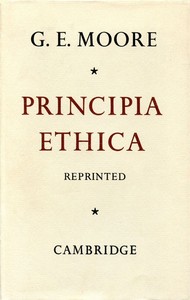Principia Ethica by G. E. Moore
"Principia Ethica" by G. E. Moore is a philosophical work published in 1903. Moore challenges the very foundation of ethics by questioning what "good" actually means. He argues that "good" cannot be defined and that attempts to do so commit the naturalistic fallacy. The work explores three fundamental questions: What is good? What things are inherently good or bad? And what actions should we take? Moore's groundbreaking arguments profoundly influenced moral philosophy
and shaped the thinking of the Bloomsbury Group. (This is an automatically generated summary.)
Read or download for free
| Reading Options | Url | Size | |||
|---|---|---|---|---|---|
| Read now! | https://www.gutenberg.org/ebooks/53430.html.images | 721 kB | |||
| EPUB3 (E-readers incl. Send-to-Kindle) | https://www.gutenberg.org/ebooks/53430.epub3.images | 298 kB | |||
| EPUB (older E-readers) | https://www.gutenberg.org/ebooks/53430.epub.images | 296 kB | |||
| EPUB (no images, older E-readers) | https://www.gutenberg.org/ebooks/53430.epub.noimages | 292 kB | |||
| Kindle | https://www.gutenberg.org/ebooks/53430.kf8.images | 490 kB | |||
| older Kindles | https://www.gutenberg.org/ebooks/53430.kindle.images | 429 kB | |||
| Plain Text UTF-8 | https://www.gutenberg.org/ebooks/53430.txt.utf-8 | 597 kB | |||
| Download HTML (zip) | https://www.gutenberg.org/cache/epub/53430/pg53430-h.zip | 266 kB | |||
| There may be more files related to this item. | |||||
Similar Books
About this eBook
| Author | Moore, G. E. (George Edward), 1873-1958 |
|---|---|
| Title | Principia Ethica |
| Note | Wikipedia page about this book: en.wikipedia.org/wiki/Principia_Ethica |
| Credits |
Produced by Josep Cols Canals, Ramon Pajares Box and the Online Distributed Proofreading Team at www.pgdp.net (This file was produced from images generously made available by The Internet Archive/Canadian Libraries) |
| Reading Level | Reading ease score: 55.9 (10th to 12th grade). Somewhat difficult to read. |
| Language | English |
| LoC Class | BJ: Philosophy, Psychology, Religion: Ethics, Social usages, Etiquette, Religion |
| Subject | Ethics |
| Category | Text |
| EBook-No. | 53430 |
| Release Date | Nov 2, 2016 |
| Most Recently Updated | Oct 23, 2024 |
| Copyright Status | Public domain in the USA. |
| Downloads | 2428 downloads in the last 30 days. |
| Project Gutenberg eBooks are always free! | |

